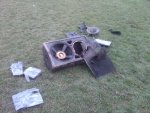Re: PSA: Blow it out yer amps!
Apparently Google is your friend, too. Why not share your incontrovertible proof? I'm willing to be proven wrong. Based on my understanding of physics - wrong as it may be - it seems that a few seconds of spinning at say 10X the normal speed relative to hundreds or thousands of hours at normal speed represents a tiny fraction of fan wear. Even if bearing wear during those few seconds is 10X per revolution due to the force of the air, vibration, etc., that's still a small number.
Heck yes. It's widely understood/experienced in the computer tech circles (google is your friend).
Take half a second to stick something in the fan (coffee stirrers work great, dry ones even better) to keep it from freewheeling. The bearing in these things are pretty delicate. And while it may not fail right off the bat, or look visibly damaged, I guarantee you it's life will be severally shortened. Even more fun - it will probably decide to die on you when being stressed. Say from a really heavy and jamming set when the amp has it pumped up to max revs. Is an amp cutting out due to thermal overload during the heaviest part of the show considered bad form? I just realized my crown amps have one fan only on the rear at least. If they do have a front fan is it enough to carry the amp under load? I now will be opening them to blow them out and also explore their redundancy too.
Then again I'm some faceless nobody on the Internet. Why spend half a second exercising due diligence and logic when nothing will probably happen anyway because anecdotally it hasn't happened to anyone you know, right?
Apparently Google is your friend, too. Why not share your incontrovertible proof? I'm willing to be proven wrong. Based on my understanding of physics - wrong as it may be - it seems that a few seconds of spinning at say 10X the normal speed relative to hundreds or thousands of hours at normal speed represents a tiny fraction of fan wear. Even if bearing wear during those few seconds is 10X per revolution due to the force of the air, vibration, etc., that's still a small number.


